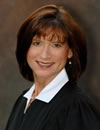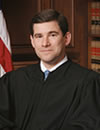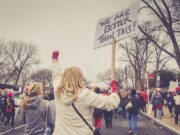Hon. Diane Sykes
United States Court of Appeals for the Seventh Circuit (2004-Present); Wisconsin Supreme Court (1999-2004); Milwaukee County Circuit Court (1992-1999)
This post is the second in a series exploring the free speech views of Judge Diane Sykes.[1] Our first post exploring Judge Sykes’ views on free speech can be found here. In this report, we look at three more cases where she wrote or joined opinions supporting First Amendment free speech rights.
- Christian Legal Society v. Walker, 453 F. 3d 853 (7th Cir. 2006)
- Backpage.com v. Dart, 807 F.3d 229 (2015)
- Ovadal v. City of Madison, 416 F.3d 531 (7th Cir. 2005)
Christian Legal Society v. Walker
In Christian Legal Society (CLS), Judge Sykes protected a campus Christian group’s First Amendment right to restrict membership to adherents of its faith. This included bans on adultery and active homosexuality. Southern Illinois University (SIU) Law School claimed the group’s rules violated state and federal law and the school’s affirmative action policies. It withheld benefits bestowed on recognized groups including the exclusive use of building space, the school’s list serve, a faculty advisor, and other perquisites.
CLS sued, claiming the school could not withhold benefits based on its beliefs. The suit claimed SIU violated CLS’s First Amendment rights of expressive association, free speech, and free exercise of religion. The district court denied CLS a preliminary injunction. Judge Sykes reversed the lower court, writing for a divided panel.
Judge Sykes began her opinion by casting doubt on the school’s proffered excuses for denying CLS official status:
As an initial matter, it is doubtful that CLS violated either of the policies SIU cited as grounds for derecognition. One is a Board of Trustees policy providing that “[n]o student constituency body or recognized student organization shall be authorized unless it adheres to all appropriate federal or state laws concerning nondiscrimination and equal opportunity.” Through two rounds of briefing in this Court – one for the injunction pending appeal and one on the merits – SIU failed to identify which federal or state law it believes CLS violated.
SIU also claims CLS violated the university’s Affirmative Action/EEO policy, which states that SIU will “provide equal employment and education opportunities for all qualified persons without regard to, [among other things,] sexual orientation.” We are skeptical that CLS violated this policy. CLS requires its members and officers to adhere to and conduct themselves in accordance with a belief system regarding standards of sexual conduct, but its membership requirements do not exclude members on the basis of sexual orientation…. Those who engage in sexual conduct outside of a traditional marriage are not invited to become CLS members unless they repent the conduct and affirm the statement of faith.
There are other reasons we are skeptical that CLS violated SIU’s Affirmative Action/EEO policy. First, CLS does not employ anyone. Second, it is not readily apparent (though certainly an argument could be made) that CLS should be considered an SIU “education opportunity” for purposes of applying the policy. On this latter point, the Affirmative Action/EEO policy by its terms applies to SIU, and there is no support in the record for the proposition that CLS is an extension of SIU. CLS is a private speaker, albeit one receiving (until it was derecognized) the public benefits associated with recognized student organization status.
Sykes then proceeded to First Amendment analysis:
Implicit in the First Amendment freedoms of speech, assembly, and petition is the freedom to gather together to express ideas – the freedom to associate. The freedom to associate assures that the majority (or a powerful or vocal minority) cannot force its views on groups that choose to express unpopular ideas.
When the government forces a group to accept for membership someone the group does not welcome and the presence of the unwelcome person “affects in a significant way the group’s ability to advocate” its viewpoint, the government has infringed on the group’s freedom of expressive association…. Infringements on expressive association are subject to strict scrutiny; the right of expressive association “may be overridden ‘by regulations adopted to serve compelling state interests, unrelated to the suppression of ideas, that cannot be achieved through means significantly less restrictive of associational freedoms.’”
Our next question is whether application of SIU’s antidiscrimination policy to force inclusion of those who engage in or affirm homosexual conduct would significantly affect CLS’s ability to express its disapproval of homosexual activity.
CLS is a faith-based organization…. It would be difficult for CLS to sincerely and effectively convey a message of disapproval of certain types of conduct if, at the same time, it must accept members who engage in that conduct. CLS’s beliefs about sexual morality are among its defining values….
Our final question is this: Does SIU’s interest in preventing discrimination against homosexuals outweigh CLS’s interest in expressing its disapproval of homosexual activity?…
What interest does SIU have in forcing CLS to accept members whose activities violate its creed other than eradicating or neutralizing particular beliefs contained in that creed? SIU has identified none. The only apparent point of applying the policy to an organization like CLS is to induce CLS to modify the content of its expression or suffer the penalty of derecognition.
On the other side of the scale, CLS’s interest in exercising its First Amendment. freedoms is unquestionably substantial. “The First Amendment protects expression, be it of the popular variety or not,” and “public or judicial disapproval of a tenet of an organization’s expression does not justify the State’s effort to compel the organization to accept members where such acceptance would derogate from the organization’s expressive message.”
The government violates the Free Speech Clause of the First Amendment when it excludes a speaker from a speech forum the speaker is entitled to enter. SIU has created a speech forum for student organizations and has bestowed certain benefits on those who are qualified to enter the forum….
CLS is the only student group that has been stripped of its recognized status on the basis that it discriminates on a ground prohibited by SIU’s Affirmative Action/EEO policy. CLS presented evidence that other recognized student organizations discriminate in their membership requirements on grounds prohibited by SIU’s policy.
For whatever reason, SIU has applied its antidiscrimination policy to CLS alone, even though other student groups discriminate in their membership requirements on grounds that are prohibited by the policy. SIU contends there is no evidence that other groups would continue to discriminate if threatened with nonrecognition, but that argument is a nonstarter.
Backpage.com is a clearinghouse website for all manner of classified ads. Its “Adult” section featured services Cook County, Illinois Sherriff Tom Dart found distasteful and possibly illegal. These services included escorts, body rubs, strippers and strip clubs, domination and fetish, male escorts, and phone sex.
Dart threatened Visa and MasterCard and urged them to stop processing payments for advertisements on Backpage. The letters and follow up intimidation worked as the companies agreed to the request.
Judge Sykes joined an opinion that properly admonished Dart for tactics that violated Backpage’s First Amendment right to host speech free from government coercion.
From the opinion:
The difference between government expression and in intimidation – the first permitted by the First Amendment, the latter forbidden by it is… “the fact that a public-official defendant lacks direct regulatory or decisionmaking authority over a plaintiff, or a third party that is publishing or otherwise disseminating the plaintiff’s message, is not necessarily dispositive…. What matters is the distinction between attempts to convince and attempts to coerce. A public-official defendant who threatens to employ coercive state power to stifle protected speech violates a plaintiff’s First Amendment rights….”
[Dart] is using the power of his office to threaten legal sanctions against the credit-card companies for facilitating future speech, and by doing so he is violating the First Amendment unless there is no constitutionally protected speech in the ads on Backpage’s website – and no one is claiming that. The First Amendment forbids a public official to attempt to suppress the protected speech of private persons by threatening that legal sanctions will at his urging be imposed unless there is compliance with his demands.
Visa and MasterCard were victims of government coercion aimed at shutting up or shutting down Backpage’s adult section (more likely aimed at bankrupting Backpage – lest the ads that the sheriff doesn’t like simply migrate to other sections of the website), when it is unclear that Backpage is engaged in illegal activity, and if it is not then the credit card companies cannot be accomplices and should not be threatened as accomplices by the sheriff and his staff.
A government entity, including therefore the Cook County Sheriff’s Office, is entitled to say what it wants to say – but only within limits. It is not permitted to employ threats to squelch the free speech of private citizens. “[A] government’s ability to express itself is [not] without restriction…. [T]he Free Speech Clause itself may constrain the government’s speech.”
Sheriff Dart is not permitted to issue and publicize dire threats against credit card companies that process payments made through Backpage’s website, including threats of prosecution (albeit not by him, but by other enforcement agencies that he urges to proceed against them), in an effort to throttle Backpage.
With very limited exceptions, none applicable to this case, censorship – “an effort by administrative methods to prevent the dissemination of ideas or opinions thought dangerous or offensive,” as distinct from punishing such dissemination (if it falls into one of the categories of punishable speech, such as defamation or threats) after it has occurred – is prohibited by the First Amendment as it has been understood by the courts.
This case pitted the right to protest in high visibility areas against the city’s claim it was acting to ensure public safety. A Christian minister placed anti-homosexual messages in a pedestrian overpass where motorists beneath would see them. Complaints about the content of the signs and drivers’ reactions to them flooded in to local police.
Police officers forbade the minister and his group from placing the signs along the overpass. A district court agreed, citing traffic safety. But the panel overturned the district court. It said questions remained about the government’s motivation and demanded a fuller record before purported government interests in safety could overcome First Amendment rights.
From the opinion Judge Sykes joined:
While it is true that the surrounding circumstances must be considered, it is also true that the city cannot threaten to prosecute protesters under this statute if the threats are nothing more than a pretext for stopping unpopular, yet protected, speech.
[Minister] Ovadal’s use of signs and banners to express a religious viewpoint is at the core of the speech that the First Amendment protects. There is no question that the morality of homosexuality is a contentious issue, but unpopular speech remains protected by the First Amendment; in fact, “[i]f there is a bedrock principle underlying the First Amendment, it is that the government may not prohibit the expression of an idea simply because society finds the idea itself offensive or disagreeable.”
We agree with the district court’s conclusion that “[a] public sidewalk does not lose its status as a traditional public forum when it passes over a highway overpass.” All public sidewalks “are held in the public trust and are properly considered traditional public fora.” Thus, as the district court correctly determined, Ovadal’s protest occurred in a public forum.
If the city had a policy that prohibited not just Ovadal’s, but all protests and all signs on all Beltline overpasses, this could certainly be a legitimate place and manner restriction because it would be clearly content-neutral. However, the city adamantly refuses to admit that such a policy exists. Instead, it insists that signs are prohibited only if they impair traffic safety. The officers are permitted to decide on an ad hoc basis whether to allow the protest to continue depending on how drivers react to the signs on the pedestrian overpass.
“Listeners’ reaction to speech is not a content-neutral basis for regulation.” … “Speech cannot … be punished or banned, simply because it might offend” those who hear it. It cannot be denied that drivers who yelled, gestured, and slammed on their brakes when they saw Ovadal’s signs created a safety hazard on the Beltline. However, it is the reckless drivers, not Ovadal, who should have been dealt with by the police, perhaps in conjunction with an appropriate time, place, and manner restriction on Ovadal.
If the restriction of Ovadal’s speech was content-based, the city must prove that prohibiting Ovadal from protesting on pedestrian walkways above the Beltline is narrowly tailored and necessary to serve a compelling state interest. Ovadal concedes that the city has an interest in protecting public safety and promoting the free flow of traffic on public streets. But, the city may still only regulate speech “if the incidental restriction on alleged First Amendment freedoms is no greater than is essential to the furtherance of [the government’s legitimate] interest.”
While there is no question that Ovadal has been completely banned from all Beltline pedestrian overpasses in the Madison area, the issue remains as to whether the ban was narrowly tailored and content-neutral. Did the police impose a “heckler’s veto” and would the same absolute “ad hoc” ban have been imposed on any display occurring on a Beltline pedestrian overpass?
[1] Internal citations to other cases have been omitted from the excerpts below.














